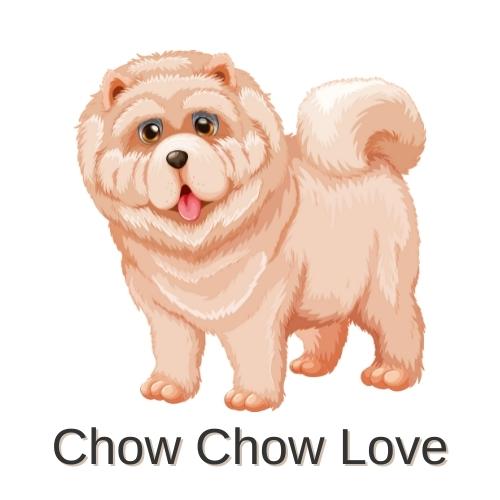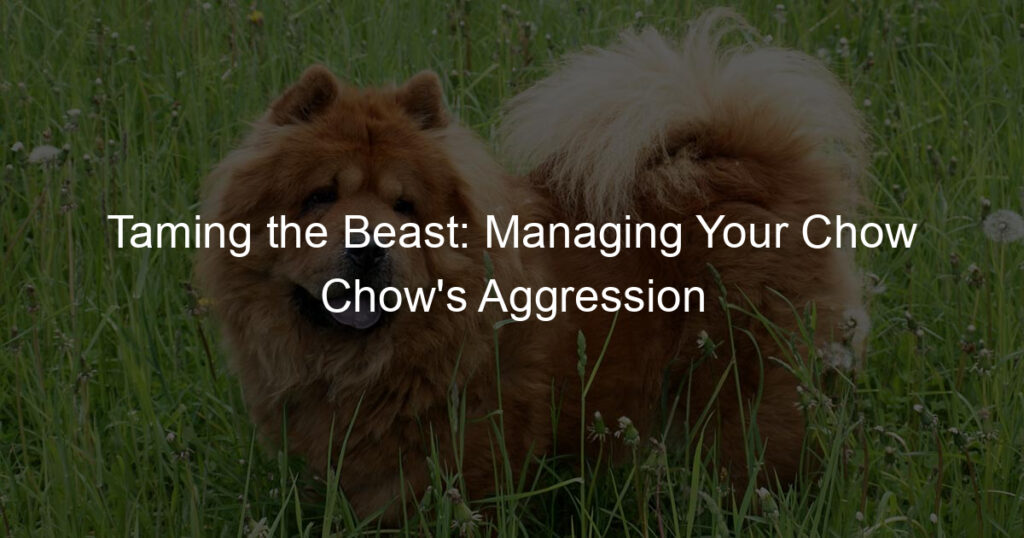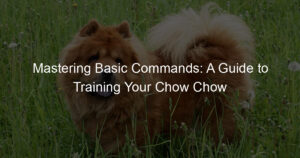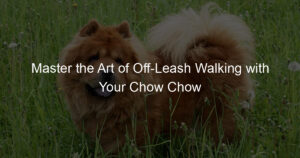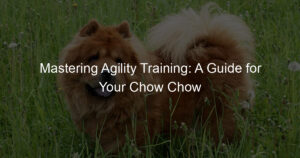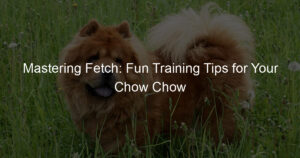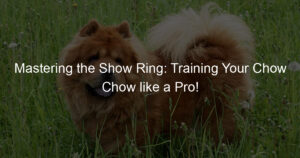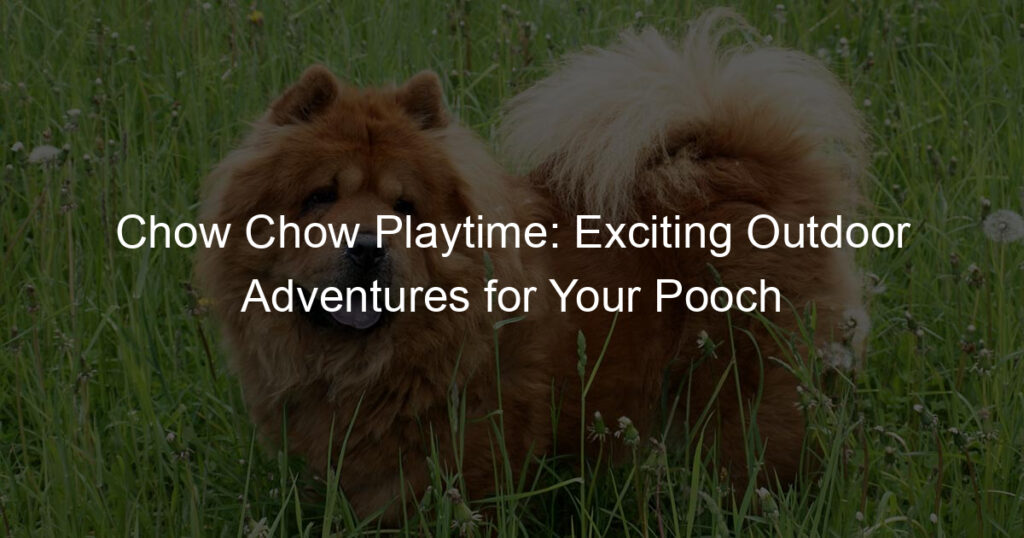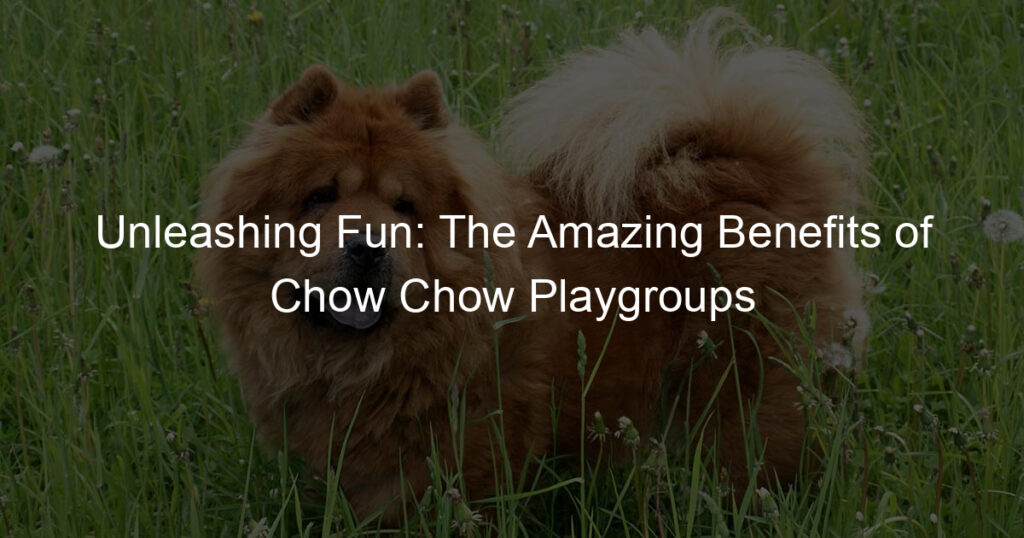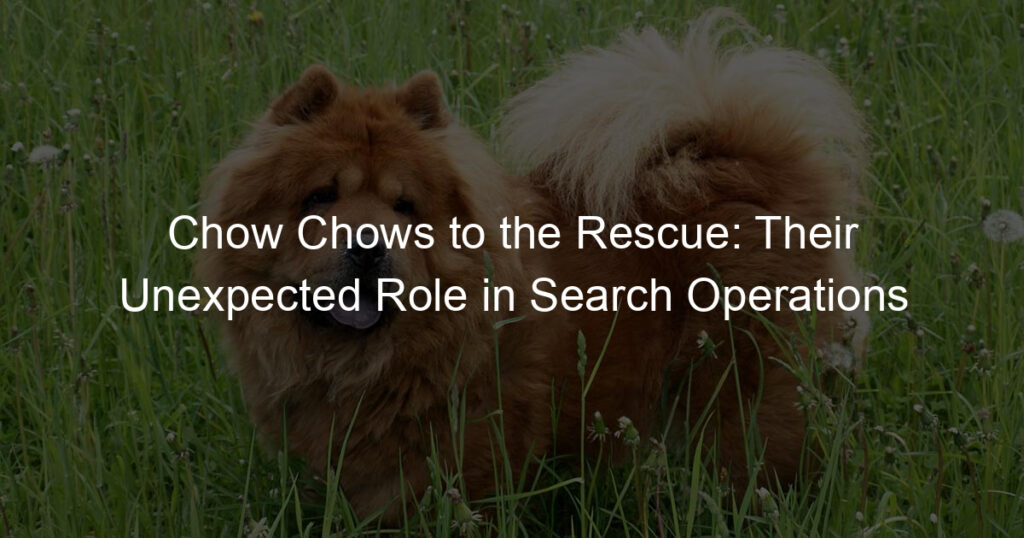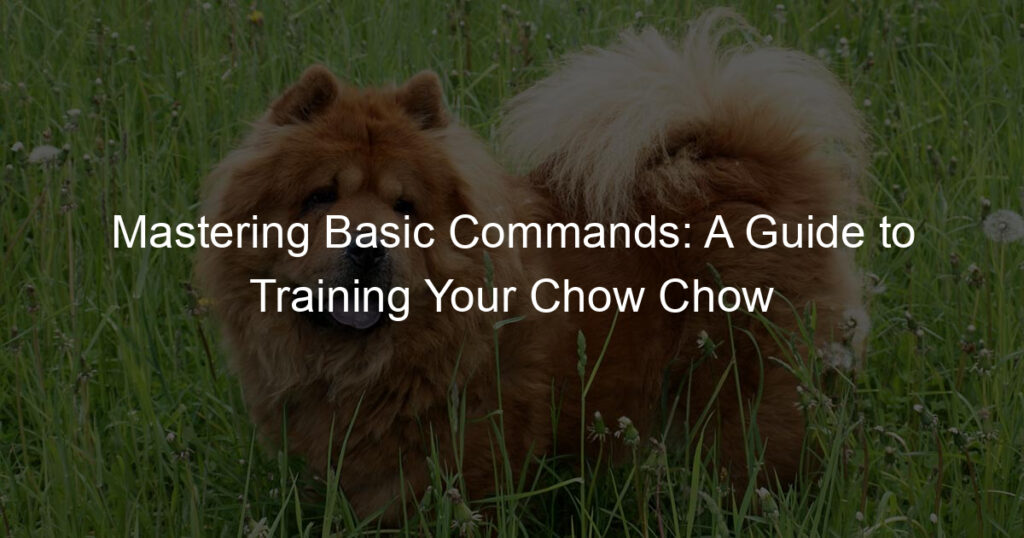
Introduction to Chow Chow Aggression
Chow Chows, with their fluffy coats and lion-like appearance, are a popular breed. However, they can sometimes display aggressive behavior. This article will help you understand the Chow Chow temperament, identify common behavior problems, and recognize signs of aggression.
Chow Chows are known for their independent and aloof nature. They are not overly affectionate and prefer to keep to themselves. This doesn’t mean they don’t love their families, but they show their affection in different ways. Understanding this can help you better manage their behavior and prevent aggression.
Chow Chows can be stubborn and resistant to training. They can also be territorial and protective of their families and homes. These traits can lead to behavior problems if not properly managed. For example, a Chow Chow might become aggressive if they feel their territory is being threatened.
It’s important to recognize the signs of aggression in your Chow Chow. These can include growling, baring teeth, and snapping. If your Chow Chow is displaying these behaviors, it’s important to seek professional help to manage their aggression.
In the following sections, we will discuss how to deal with Chow Chow aggression, the importance of training and socialization, and share some success stories of managing Chow Chow aggression. Stay tuned to learn more about this fascinating breed and how to ensure a harmonious relationship with your Chow Chow.
Dealing with Dog Aggression: The Chow Chow
Understanding and dealing with dog aggression can be a challenging task, especially when it comes to specific breeds like the Chow Chow. Let’s delve into the causes of Chow Chow aggression and how to manage it effectively.
Understanding the Causes of Chow Chow Aggression
There are several factors that can contribute to aggression in Chow Chows. These can be broadly categorized into genetic, environmental, and health-related factors.
-
- Genetic Factors
Like many other traits, aggression can be inherited. Chow Chows have been bred for centuries to be guard dogs, which might explain their aggressive tendencies. However, not all Chow Chows are aggressive, and a lot depends on the specific genetic makeup of the individual dog.
-
- Environmental Factors
Chow Chows are highly sensitive to their environment. Factors such as lack of socialization, harsh treatment, or a stressful environment can trigger aggressive behavior. It’s important to provide a safe, nurturing environment for your Chow Chow to reduce the chances of aggression.
-
- Health-Related Factors
Health issues can also lead to aggression in Chow Chows. Pain, discomfort, or underlying medical conditions can cause a normally calm dog to become aggressive. Regular vet check-ups can help identify and address health issues before they lead to behavioral problems.
In conclusion, understanding the causes of aggression in Chow Chows is the first step towards managing it. By being aware of the genetic, environmental, and health-related factors, you can take proactive steps to prevent aggression and ensure your Chow Chow is a happy, well-adjusted member of your family.
Effective Strategies for Managing Dog Aggression
Managing your Chow Chow’s aggression can be a challenging task. However, with the right strategies, it is possible to turn your aggressive Chow Chow into a calm and friendly companion. Here are some effective strategies that can help manage your dog’s aggression:
-
- Positive Reinforcement Training
Positive reinforcement training is a method that rewards good behavior. When your Chow Chow behaves well, you give them a treat, a toy, or lots of praise. This encourages them to repeat the good behavior. For example, if your Chow Chow sits calmly when a stranger approaches instead of growling or barking, you might give them a treat. Over time, your Chow Chow will learn that good behavior leads to rewards.
-
- Professional Dog Training
Professional dog trainers have the skills and experience to handle aggressive dogs. They can provide you with the right tools and techniques to manage your Chow Chow’s aggression. A professional dog trainer can also help you understand your dog’s behavior better, which can be very helpful in managing aggression. Remember, it’s important to choose a trainer who uses humane methods and understands the specific needs of Chow Chows.
-
- Medication and Veterinary Intervention
Sometimes, dog aggression can be a result of underlying health issues. If your Chow Chow’s aggression is sudden and unexplained, it’s a good idea to consult a vet. They can check for any health issues that might be causing the aggression. In some cases, medication might be necessary to manage your dog’s aggression. Always consult with a vet before giving your dog any medication.
Remember, managing dog aggression takes time and patience. Don’t expect immediate results. Keep working with your Chow Chow, and over time, you will see improvement.
Chow Chow Training: A Key to Managing Aggression
Training your Chow Chow effectively is a crucial step in managing their aggression. With the right techniques, you can help your pet become more calm and controlled. Here are some methods that have proven successful in managing Chow Chow aggression.
Training Techniques for an Aggressive Chow Chow
Training an aggressive Chow Chow requires patience, consistency, and a clear understanding of the dog’s needs. Here are three key techniques:
-
- Establishing Dominance
Chow Chows are naturally dominant dogs. It’s essential for you, as the owner, to establish your dominance early on. This doesn’t mean being harsh or aggressive. Instead, it’s about showing your Chow Chow that you’re the leader. This can be done through simple actions like eating before your dog, entering and exiting rooms first, or controlling when playtime starts and ends.
-
- Consistent Training Sessions
Consistency is key in any dog training, especially for Chow Chows. Regular, short training sessions are more effective than infrequent, long ones. Aim for daily training sessions of about 15 minutes each. This helps your Chow Chow understand what’s expected of them and reduces their chances of becoming aggressive.
-
- Using Rewards and Positive Reinforcement
Positive reinforcement is a powerful tool in managing aggression. Reward your Chow Chow for good behavior with treats, praise, or extra playtime. This encourages them to repeat the behavior. Remember, it’s important to reward your dog immediately after they display the desired behavior, so they associate the reward with their action.
By implementing these techniques, you can help manage your Chow Chow’s aggression and foster a more peaceful home environment. Remember, every dog is unique, and what works for one might not work for another. It’s important to be patient and persistent in your training efforts.
Common Mistakes in Chow Chow Training
Training a Chow Chow can be a rewarding experience, but it’s important to avoid common pitfalls that can hinder progress and potentially exacerbate aggressive behavior. Here are some common mistakes:
-
- Using Punishment-Based Techniques
Punishment-based techniques can often lead to more harm than good. When a Chow Chow is punished, it may become fearful and more aggressive, rather than learning from its mistakes. According to a study by the Journal of Applied Animal Behaviour Science, dogs trained using punishment are 25% more likely to respond with aggression. Instead of punishment, consider using positive reinforcement techniques.
-
- Inconsistent Training
Inconsistency in training can confuse your Chow Chow and lead to unpredictable behavior. If you allow your dog to jump on you one day, but scold it for the same behavior the next, it won’t understand what is expected. Consistency is key in dog training. Make sure all family members are on the same page about rules and commands.
-
- Ignoring Warning Signs of Aggression
Ignoring warning signs of aggression can lead to serious problems down the line. Growling, snapping, and showing teeth are all signs that your Chow Chow may be feeling threatened or uncomfortable. Instead of ignoring these signs, it’s important to address them head-on. Consult with a professional dog trainer or behaviorist if you notice any signs of aggression in your Chow Chow.
By avoiding these common mistakes, you can help ensure that your Chow Chow training is effective and beneficial for both you and your pet.
Chow Chow Socialization: A Solution to Aggression
When it comes to managing aggression in Chow Chows, socialization plays a pivotal role. It’s not just about teaching your dog to behave; it’s about helping them feel comfortable and confident in various situations. Let’s delve into the importance of socialization in managing dog aggression.
Importance of Socialization in Managing Dog Aggression
Socialization is a critical aspect of managing dog aggression. It involves introducing your Chow Chow to a variety of experiences, including different environments, people, and other animals. This helps them learn to respond without fear or aggression. Here are some key benefits of socialization:
-
- Reducing Fear and Anxiety
Many dogs act out of fear and anxiety. By exposing your Chow Chow to different situations and people, you can help reduce their fear and anxiety. This can significantly decrease aggressive behaviors.
-
- Improving Dog-to-Dog Interactions
Socialization also helps improve your Chow Chow’s interactions with other dogs. By allowing them to interact with other dogs in controlled environments, they can learn to communicate and behave appropriately.
-
- Building Confidence in Your Chow Chow
Confidence is key in reducing aggression. A confident dog is less likely to feel threatened and react aggressively. Socialization helps build your Chow Chow’s confidence by providing positive experiences and reinforcing good behavior.
In conclusion, socialization is a powerful tool in managing Chow Chow aggression. It helps reduce fear and anxiety, improve dog-to-dog interactions, and build confidence in your dog. Remember, it’s never too late to start socializing your Chow Chow. With patience and consistency, you can help your furry friend become a well-behaved and confident dog.
How to Socialize an Aggressive Chow Chow
When you have an aggressive Chow Chow, it can be a challenge to socialize them. However, with the right approach, you can help your dog become more comfortable around others. Here are some strategies that can help:
- Gradual Exposure to Other Dogs and PeopleIntroducing your Chow Chow to new experiences gradually can help them adjust without feeling overwhelmed. Start by taking your dog to quiet places where they can observe other dogs and people from a safe distance. As your Chow Chow becomes more comfortable, you can slowly introduce them to more crowded environments. Remember, patience is key in this process.
- Enrolling in Dog Socialization ClassesDog socialization classes can be a great way for your Chow Chow to learn how to interact with other dogs in a controlled environment. Trained professionals will guide your dog through various social situations, teaching them appropriate behavior. These classes can also provide a safe space for your dog to interact with other dogs under supervision.
- Using Treats and Rewards to Encourage Positive InteractionsPositive reinforcement is a powerful tool in dog training. When your Chow Chow behaves well around other dogs or people, reward them with a treat or praise. This will help them associate positive experiences with social interactions, making them more likely to behave well in the future.
Remember, every dog is unique and what works for one Chow Chow may not work for another. It’s important to be patient and consistent in your approach. With time and effort, you can help your aggressive Chow Chow become more sociable and comfortable around others.
Case Studies: Successful Management of Chow Chow Aggression
Let’s look at some real-life examples of Chow Chows who have successfully managed their aggression. These case studies will provide valuable insights into how you can help your own Chow Chow become a more relaxed and friendly companion.
- Case Study 1: From Aggressive to Affectionate: A Chow Chow’s TransformationMeet Max, a Chow Chow who was known for his aggressive behavior. His owners were at their wits’ end, unsure of how to handle his aggression. They decided to seek professional help and hired a dog behaviorist. The behaviorist worked with Max, using positive reinforcement techniques to reward good behavior. Over time, Max’s aggression decreased significantly. He became more affectionate towards his owners and even started to enjoy the company of other dogs. This case study shows that with patience and the right approach, even the most aggressive Chow Chows can change.
- Case Study 2: Overcoming Fear-Based Aggression in a Chow ChowNext, we have Bella, a Chow Chow who displayed aggressive behavior due to fear. Bella was adopted from a shelter and had a history of abuse. Her new owners noticed her aggression and realized it was fear-based. They worked closely with a dog trainer who specialized in fear-based aggression. Bella was gradually exposed to the things she feared in a controlled environment. This helped her to overcome her fears and reduce her aggression. Bella’s story teaches us that understanding the root cause of aggression is crucial in managing it.
- Case Study 3: The Role of Training in Managing a Chow Chow’s AggressionLastly, let’s look at the story of Rocky, a Chow Chow who was aggressive towards strangers. His owners decided to enroll him in obedience training. The training helped Rocky to understand commands and behave appropriately. He learned to trust his owners’ judgment and became less aggressive towards people he didn’t know. Rocky’s case study emphasizes the importance of training in managing a Chow Chow’s aggression.
In conclusion, these case studies show that managing Chow Chow aggression is possible with the right approach, understanding, and patience. Remember, every Chow Chow is unique, and what works for one may not work for another. It’s all about finding the right method for your furry friend.
Conclusion: The Journey to Taming Your Chow Chow’s Aggression
As we conclude our discussion on managing Chow Chow aggression, it’s important to remember that the journey to a well-behaved and friendly Chow Chow is not a sprint, but a marathon. It requires patience, consistency, and a deep understanding of your furry friend’s temperament and behavior. Let’s recap the key strategies and insights we’ve covered.
- Recap of Key Strategies for Managing Chow Chow Aggression
Firstly, we discussed the importance of early socialization. Introducing your Chow Chow to a variety of people, animals, and environments can help curb aggressive tendencies. We also emphasized the need for positive reinforcement training, rewarding your Chow Chow for good behavior rather than punishing them for bad behavior. Lastly, we explored the role of exercise in managing aggression, as a tired Chow Chow is a well-behaved Chow Chow. - Importance of Patience and Consistency in Training
Training a Chow Chow requires a great deal of patience and consistency. Remember, change doesn’t happen overnight. It’s crucial to remain consistent in your training methods and patient with your Chow Chow’s progress. Consistency helps your Chow Chow understand what is expected of them, while patience ensures you don’t rush the process and potentially cause more harm than good. - Final Thoughts on the Chow Chow’s Temperament and Behavior
Chow Chows are naturally aloof and independent dogs, which can sometimes be mistaken for aggression. Understanding your Chow Chow’s temperament is key to managing their behavior. They are not inherently aggressive dogs, but their unique personality traits require a tailored approach to training. With patience, consistency, and the right strategies, you can help your Chow Chow become a well-behaved and friendly companion.
In conclusion, taming your Chow Chow’s aggression is a journey that requires understanding, patience, and consistency. With the right approach, you can help your Chow Chow become a well-behaved and friendly member of your family. Remember, every Chow Chow is unique, and what works for one may not work for another. Stay patient, stay consistent, and most importantly, enjoy the journey!
